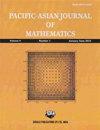具有所有真商的群的结构实际上是幂零的
IF 0.7
3区 数学
Q2 MATHEMATICS
引用次数: 0
摘要
正无穷群在无限群理论中占有重要地位。对于每一个$c \geq 0$,我们更一般地考虑JNN $_c$ F无限(或者,在某些地方,离散)群,它们是无拟合的;这些群$G$使得$G$的每个适当商实际上是类- $c$零幂的,而$G$本身不是,另外$G$没有任何非平凡的阿贝尔正规子群。当$c = 1$时,我们得到了没有非平凡阿贝尔正规子群的刚好非(虚阿贝尔)群。我们的第一个结果是,一个有限生成的无限群是虚类\nbd$c$幂零当且仅当只有有限多个子群作为$G$的开正规子群$K$的下中心级数项$\gamma_{c+1}(K)$产生。在此基础上,我们证明了几个结构定理。例如,我们用上述形式$\gamma_{c+1}(K)$的子群来描述JNN $_c$ F无限群。给出了JNN $_c$ F无限群作为虚幂零无限群的合适逆极限的描述。对于遗传JNN $_c$ F群族,我们建立了类似的结果,例如,我们证明了一个无拟合JNN $_c$ F有限(或离散)群是遗传JNN $_cF$当且仅当有限指数的每个极大子群都是JNN $_c$ F。最后,我们给出了遗传JNN $_c$ F群的一个构造,它使用已知的遗传无限群族作为输入。本文章由计算机程序翻译,如有差异,请以英文原文为准。
The structure of groups with all proper quotients virtually nilpotent
Just infinite groups play a significant role in profinite group theory. For each $c \geq 0$, we consider more generally JNN$_c$F profinite (or, in places, discrete) groups that are Fitting-free; these are the groups $G$ such that every proper quotient of $G$ is virtually class-$c$ nilpotent whereas $G$ itself is not, and additionally $G$ does not have any non-trivial abelian normal subgroup. When $c = 1$, we obtain the just non-(virtually abelian) groups without non-trivial abelian normal subgroups. Our first result is that a finitely generated profinite group is virtually class\nbd$c$ nilpotent if and only if there are only finitely many subgroups arising as the lower central series terms $\gamma_{c+1}(K)$ of open normal subgroups $K$ of $G$. Based on this we prove several structure theorems. For instance, we characterize the JNN$_c$F profinite groups in terms of subgroups of the above form $\gamma_{c+1}(K)$. We also give a description of JNN$_c$F profinite groups as suitable inverse limits of virtually nilpotent profinite groups. Analogous results are established for the family of hereditarily JNN$_c$F groups and, for instance, we show that a Fitting-free JNN$_c$F profinite (or discrete) group is hereditarily JNN$_cF$ if and only if every maximal subgroup of finite index is JNN$_c$F. Finally, we give a construction of hereditarily JNN$_c$F groups, which uses as an input known families of hereditarily just infinite groups.
求助全文
通过发布文献求助,成功后即可免费获取论文全文。
去求助
来源期刊
CiteScore
1.30
自引率
0.00%
发文量
93
审稿时长
4-8 weeks
期刊介绍:
Founded in 1951, PJM has published mathematics research for more than 60 years. PJM is run by mathematicians from the Pacific Rim. PJM aims to publish high-quality articles in all branches of mathematics, at low cost to libraries and individuals. The Pacific Journal of Mathematics is incorporated as a 501(c)(3) California nonprofit.

 求助内容:
求助内容: 应助结果提醒方式:
应助结果提醒方式:


